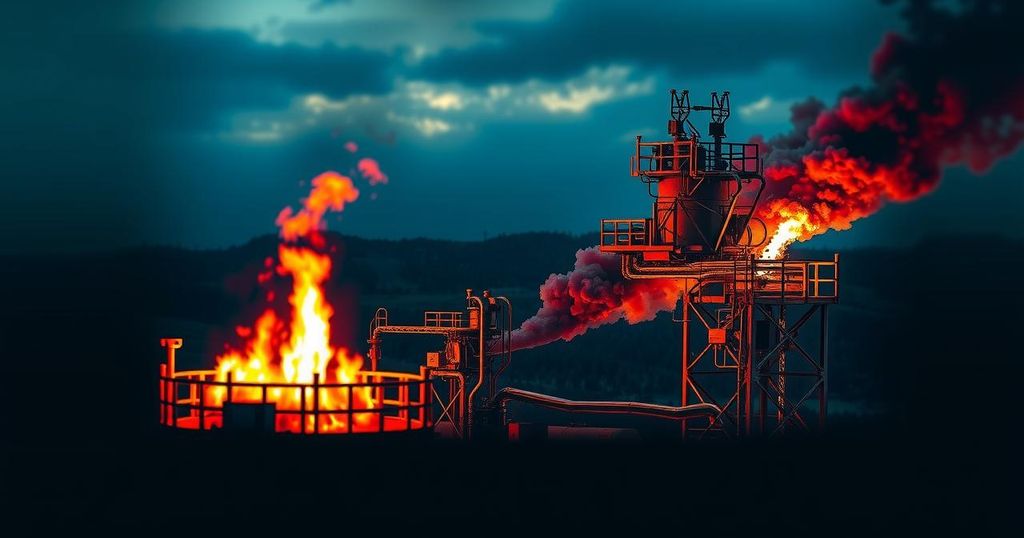House Advances Anti-Gas Flaring Bill to Address Environmental and Economic Concerns
The House of Representatives has passed the Anti-Gas Flaring Bill to prohibit gas flaring under regulated conditions, sponsored by Hon. Babajimi Benson. The bill intends to mitigate environmental impacts, enhance energy generation, and ensure compliance through monitoring and penalties. It aims to align Nigeria’s oil and gas operations with international climate commitments and provides for compensations for affected communities.
The House of Representatives has successfully advanced the Anti-Gas Flaring (Prohibition and Enforcement) Bill, aimed at prohibiting the flaring and venting of natural gas under strictly regulated conditions. This legislation, sponsored by Honorable Babajimi Benson, seeks to promote the efficient use of gas resources to foster economic growth and energy generation within Nigeria.
In the recent debate, Honorable Benson emphasized the comprehensive framework for monitoring and enforcing compliance with the bill, which seeks to mitigate the detrimental environmental, health, and economic impacts associated with gas flaring. He articulated that gas flaring has persisted as a significant issue in Nigeria for decades, contributing to environmental degradation and public health crises.
The implications of gas flaring are far-reaching, with its association to increased greenhouse gas emissions and resultant global warming, alongside contributing to acid rain. Additionally, the health ramifications include chronic respiratory and cardiovascular diseases prevalent among communities located near flaring sites. The legislation aligns Nigeria’s oil and gas industry with international climate change commitments, such as the Paris Agreement.
Honorable Benson delineated that the bill mandates a strict prohibition on gas flaring, allowing exceptions only in genuine emergencies or with explicit authorization from the Nigerian Upstream Petroleum Regulatory Commission (NUPRC). Under the proposed law, operators must create and implement Gas Utilization Plans, outlining how gas that would otherwise be wasted will be captured and commercialized.
He stated, “Offenders who violate these provisions face stringent penalties, including fines of $5 per 1,000 standard cubic feet of gas flared and potential suspension of operations for repeat violations.” The bill also establishes a mechanism for compensating communities adversely affected by gas flaring and includes provisions for environmental restoration.
Furthermore, transparency and accountability are mandated within this legislative framework, requiring operators to submit reports on gas flaring incidents that will be audited by the NUPRC for public transparency. The anticipated benefits of the bill include reductions in carbon emissions, advancements towards Nigeria’s climate goals, and unlocking the potential of natural gas to enhance electricity generation and job creation.
The NUPRC will oversee the implementation of this bill, ensuring compliance through audits, enforcing penalties, and facilitating gas utilization initiatives in collaboration with operators and development partners. The Ministry of Environment and other relevant agencies will assist in monitoring environmental impacts and ensuring necessary remediation measures are taken.
The issue of gas flaring has been endemic in Nigeria’s oil and gas sector, leading to serious environmental degradation and public health risks. This practice not only contributes to greenhouse gas emissions but also results in the wastage of a valuable energy resource. Despite international commitments to combat climate change, gas flaring remains a critical concern. The proposed legislation aims to align Nigeria with global environmental standards while also promoting economic utilization of natural gas as a resource for energy generation and economic growth. The bill emphasizes strict enforcement, transparency, and community compensation, aiming for a reduction in the negative impacts of gas flaring in Nigeria.
In conclusion, the House of Representatives’ passage of the Anti-Gas Flaring (Prohibition and Enforcement) Bill marks a significant step towards addressing the longstanding issues associated with gas flaring in Nigeria. The legislation not only seeks to mitigate environmental damage and public health risks but also aims to promote the efficient use of natural gas for economic benefit. The establishment of penalties, monitoring mechanisms, and community engagement efforts underscores a commitment to sustainable practices and compliance with international climate commitments. This bill represents a critical approach to fostering environmental stewardship and economic development within the nation.
Original Source: www.arise.tv




Post Comment